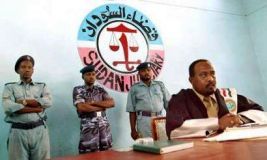Sudan will not hand over officials for international trial on Darfur war crimes
KHARTOUM, Sudan, Feb 5, 2005 (AP) — The Sudanese government won’t send Sudanese citizens or officials suspected of Darfur war crimes charges to any international court, the first vice president said Saturday.

|
|
special judge, sits in court in Nyala Sept 30, 2004 to try six Sudanese men accused of belonging to the Janjaweed, who killed 24 people in the southern Darfur region in Oct 2003.(Reuters). |
Earlier this week, a U.N. commission report to the world body recommended 51 Sudanese people — including high-ranking government officials, rebels and Arab militiamen known as the Janjaweed — stand trial at the International Criminal Court on war crimes charges related to the 2-year Darfur conflict.
The panel’s report also said government-backed militias were still involved in rape, mass killings and wanton destruction in Darfur, a region the size of France where fighting has left at least 70,000 people dead and forced more than 2 million displaced from their homes.
Sudan ‘s first vice president, Ali Osman Mohammed Taha, told a rally in the North Darfur capital of Fasher that anyone found to have committed human rights-related crimes will be dealt with by Sudanese authorities.
“What is being reported about of a trial of some individuals or officials in courts outside the Sudan is something we will not accept as a government,” Sudan ‘s state-run news agency quoted Taha as saying.
Italian law professor Antonio Cassese, the chair of the panel that produced the Darfur report, said a sealed envelope containing 51 names of senior officials, security forces and other citizens accused of serious war crimes has been sent to U.N. Secretary-General Kofi Annan.
The identities of about 40 more individuals accused of similar abuses, but with less evidence gathered against them, have been sent to the U.N. Commissioner for Human Rights for possible further investigations, Cassese told The Associated Press in Egypt in a telephone interview.
None of the names have been made public to ensure due process is carried out and to protect witnesses.
Cassese’s panel recommended the U.N. Security Council immediately refer the situation in Darfur to the International Criminal Court, the world’s first permanent war crimes tribunal, something the U.S. government has objected to and could use its veto to block.
The court, in The Hague, is supposed to handle cases involving genocide, war crimes and crimes against humanity when the countries involved can’t work out a solution on their own. Yet the administration says the court could be used for frivolous or politically motivated prosecutions of U.S. troops.
Washington is lobbying Security Council members for a new tribunal to prosecute alleged crimes from Darfur which would operate with the African Union.
Cassese, a human rights expert who was president of the U.N. war crimes tribunal for former Yugoslavia from 1993-1997, said the Bush administration should let the case be dealt with by the International Criminal Court.
“The United States … has been the most outspoken state on Darfur and claimed genocide had taken place, which we didn’t agree with,” Cassese said.
“In a way this would not be consistent with opposing the referral (of the case) by the Security Council to the International Criminal Court” to ensure people accused of human rights abuses face trial, he said.
Annan has said the alleged perpetrators of human rights abuses should be brought to justice. His call came as the Security Council, and by extension the U.N., has been dogged by allegations that they are doing too little to stop the conflict.
The Darfur conflict began when the rebels took up arms against what they saw as years of state neglect and discrimination against Sudanese of African origin. The government is accused of responding with a counterinsurgency campaign in which the Janjaweed, an Arab militia, committed wide-scale abuses against the African population.
